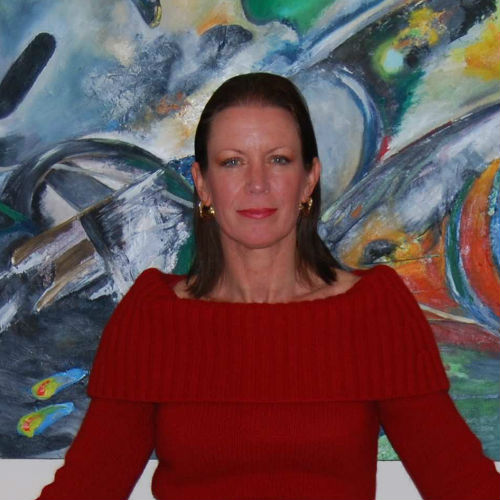Visiting Poets
Frieda Hughes
British poet and painter Frieda Hughes’s work has appeared in The New Yorker, Paris Review, and London Magazine. Her first full-length collection of poems, Wooroloo, was published by HarperCollins in 1997. Hughes’s work unites a painterly vision with a poetic exploration of human relationships and the natural world.
Daughter of British Poet Laureate Ted Hughes and American poet Sylvia Plath, Hughes studied art in London, traveled extensively (often by motorcycle), and eventually set up studios in the hamlet of Wooroloo, Australia. She has enjoyed numerous group and solo exhibitions in Australia, the U.S., and England, where her oil paintings received an award from the Royal Academy in London. Hughes is also the author and illustrator of children’s books. She now makes her home in London, with her husband, Hungarian-born painter Lazlo Lukacs.
The Sylvia Plath Collection in the Mortimer Rare Book Room, Neilson Library, Smith College, contains Sylvia Plath’s journals, letters, drafts of the Ariel poems, as well as first editions of works by Ted Hughes, and children’s books written and illustrated by Ms. Hughes.
Select Poems
So big in life, head like a chopping block
Beak like a carving knife,
His hysterical voice cracked branches, his laugh
Stripped bark from the wood-borers.
But in the twilight something got him,
So close to the house I should have heard.
He was left like a taunt, a dead bird
By an empty chicken run.
Now his dusk-stained feathers rock
In their dead grass cradle,
His bitten body is the flame
From which these moths escape.
That beak is buried in the sucked-out skull
Where eyes were lost in another mouth. His small crate,
Ant-eaten already, has ribs open like rafters
To welcome flies, and his wings rest like two open fans beside him.
Stripped of what made him
He is only a fraction of his noise.
From WOOROLOO (HarperCollins, 1998)
Christmas night. The three of us,
Eating steak and salad without
A relative between us, beside us,
Or even at the end of a table
That would sit twelve, if we had chairs.
He appeared at the floor-deep window,
A sudden little red thought. Lost,
When we looked, like a name on a tongue-end,
Never certain. Ear tips like a claw hammer,
Face like a chisel, then gone.
He was back, two bits later, whippet body
Wanting steak fat. Half grown,
His small feet black as match head,
His nose not able to let
The smell of meat alone.
His very presence begged us for a bit,
Hungry in the houselight. And there she was,
Just as motherless. His sister,
Coming for dinner,
Threading the field like a long needle.
From WOOROLOO (HarperCollins, 1998)
It was years before I dug her out
From where her shadow lay, like a bloodstain
Beneath the black stones I had
weighted her down with.
Her smile was crooked,
She had been dead awhile.
Back then, when the small child watched,
She said she was a relative. She beckoned,
A sweet promise coated the lips that kissed, like honey,
But her eyes were empty already.
When the child reached small hands
Into those holes, she found nothing
Behind the sounds the mouth made,
But the tongue flapping.
“Come live with me!” it cried,
Nostrils spread above like nose wings
As if the face would take off from its neck-end
Like a ghastly bald crow.
Seeing her mother was a shadow not hearing,
The father not found
To know his daughter was disappearing,
The child became blank, wiped clean like a pale sea stone.
Made herself as hollow as a dead tree,
Not worth having.
Her days were as lost as marbles, even her name
Had rolled between a crack in the floorboards.
She was stolen after all, and in her silence
The visitor grew dim. Uncertain. Receded like a dull fox
Just before dawn, barely left a scent behind
On door frames and bed linen, then was gone.
From WOOROLOO (HarperCollins, 1998)

